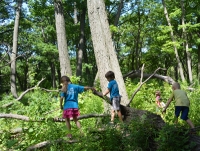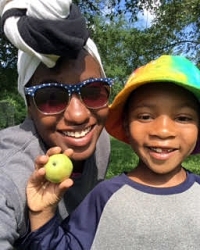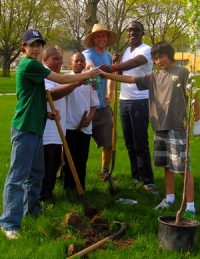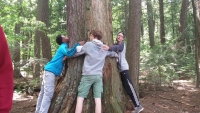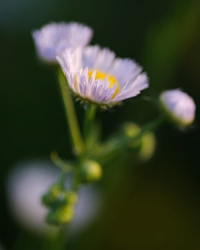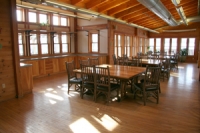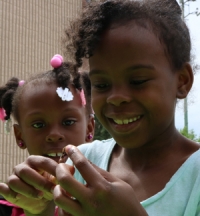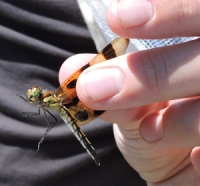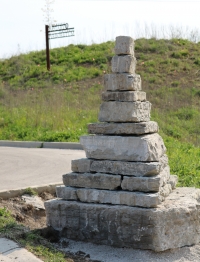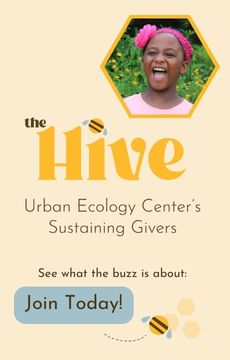
Milwaukee Urban Ecology Blog
Mary (not her real name) was excited. She could smell the earthiness and hear the wind rustling the trees that told her that today’s lesson was going to be outdoors. She bounced slightly from foot to foot as her favorite Urban Ecology Center educator, Ms. Regina, described the day’s activities. “Can I run now?” Mary asked her teacher from school. “Yes, go for it!” her teacher replied. Smiling, Mary ran across the field, exhilarated by the fresh air and the ground pounding beneath her feet.
As a child, my bed was flush up against the window in my bedroom. That window provided me with my first encounters with nature. In winter, I was so mesmerized by the snow-capped trees and gently covered ground, I would stare out the window for hours. It became a sort of game for me to decipher when the deer would pop out from beyond the trees. In summer, the breeze would come through the open window and at night the crickets would put me to sleep. In the springtime, I’d eagerly await the flowers and the smells that would come from the forest.
As we reflect on the state of our city, we are deeply saddened by the events of this past weekend and the underlying issues that have afflicted Milwaukee for decades. They are complex, systemic issues that cannot be solved overnight or oversimplified. There have been many voices responding to and explaining the unrest this week, and we are listening intently to the pain, anger, sadness and messages of hope and growth being expressed by community members.
I have said many times before that the Outdoor Leader Program is by far the best first job I could have gotten. Unlike many other jobs, I was not given one-day training and thrown into my work; I was given several weeks to learn. All of the staff that volunteered to train, teach, and work with us were patient and did the best that they could to take care of us and our needs. In the weeks that I was given I created unbreakable bonds and friendships with my coworkers as well as experiences that I never would have gotten anywhere else.
On a regular basis I get to tell people the story of the Urban Ecology Center, and I love watching the way their eyes light up as I describe the transition that Riverside Park has gone through from beauty to decadence and back again in its 120 year history. So many groups have worked hard to make this transition possible, and it’s exciting to be a part of it.
During hot months, prairies come alive with phenomenal displays of wildflowers and the prairie restorations of the Rotary Centennial Arboretum at Riverside Park are, right now, in full bloom. There you can find this week’s wildflower: Prairie Fleabane (Erigeron strigosus). With flowerheads that look like small, delicate daisies, prairie fleabane is a member of Asteraceae, the asters. Asteraceae is one of the two biggest families of plants in the world along with Orchidaceae, the orchids. Which family is bigger depends on who’s counting what as a species.
Every choice we make about the form and function of our buildings is made with the environment in mind. From energy sources to recycled materials, Urban Ecology Center facilities provide real life examples of green building practices and management. Visit us and see all the smart ways you can make your home and business greener.
“Good morning pretty lady!” exclaimed a Neighborhood Environmental Education Project student a few weeks ago, as I passed her class walking near the lagoon. I never quite know what to expect, as I head to work each morning. Her inviting smile and her silly demeanor were a welcome surprise. I knew I was going to have a good day. I am an educator with our ever-growing after school program and my morning walks have offered me time to reflect on my work with youth and community members.
It is the season of showy butterflies, buzzing cicadas, crackling grass hopper wings and CRIKT research. Nope, that is not a typo. CRIKT stands for “Citizens Researching Invertebrate Kritters Together” and this research team at the Urban Ecology Center is leading the nation in its approach to field ecological research. “Invertebrate Kritters” refers to the vast array of animals found in the insect, spider and mite categories. Because invertebrates impact people in a variety of ways: pollinating crops, decimating crops and invoking some of our greatest fears or senses of awe, they have been studied quite a bit over the years. So what sets CRIKT apart? It is WHO is involved and WHERE they work.
Studying nature is a great way to feel young…comparatively speaking, that is. There are trees that are hundreds of years old as well as turtle and bird species that can easily outlive the humans who care for them. The entire human race is like a newborn when compared to billion-year-old rocks. It’s mind blowing! Thanks to a generous gift from the Franke family, we’ve created a way to explore this concept of time through nature. We’re proud to introduce a new treasure, a 3 Billion Year Walk through the Milwaukee Rotary Centennial Arboretum.
Copyright © 2023 The Urban Ecology Center

